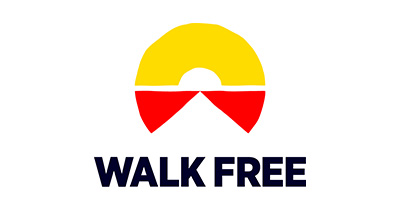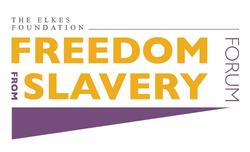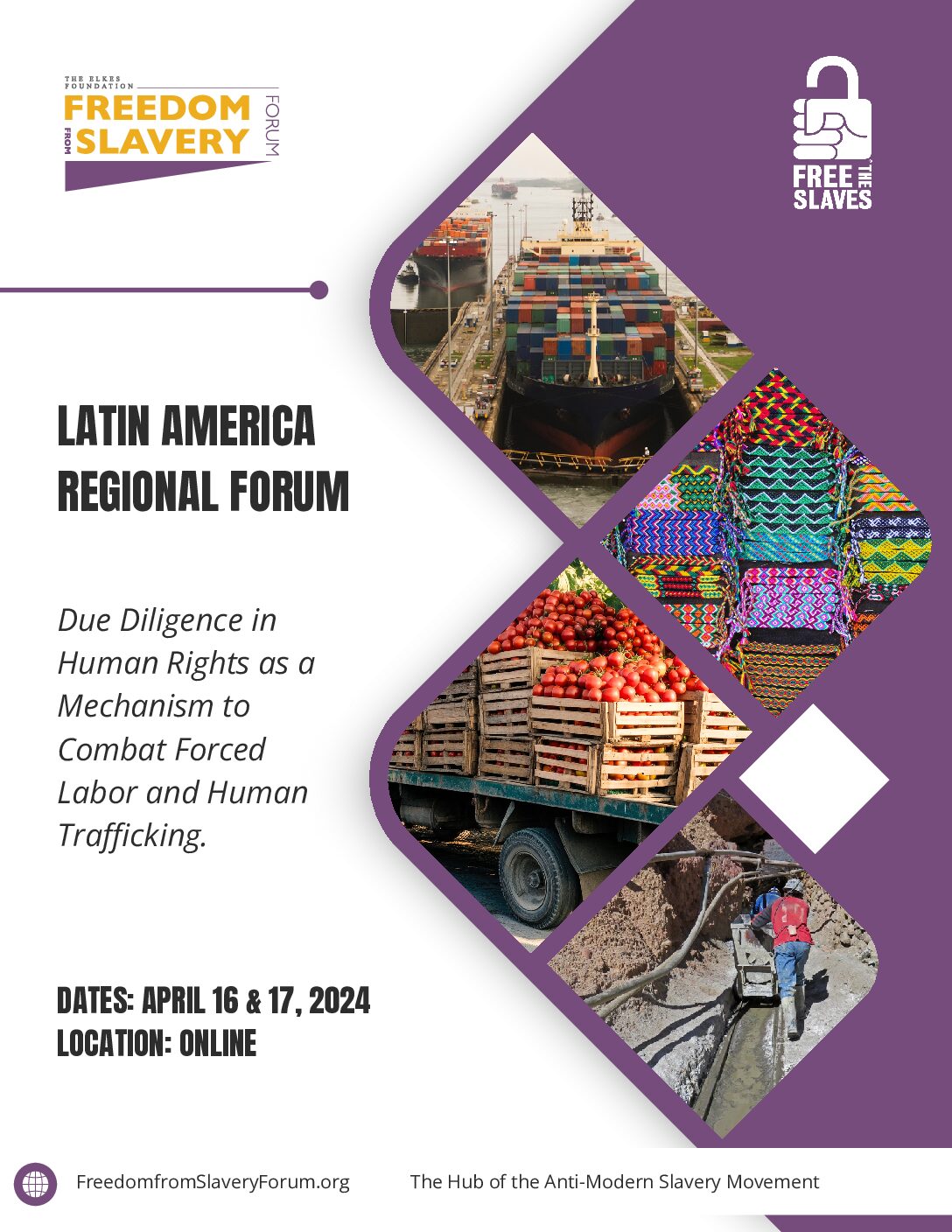2024 Latin America Regional Freedom from Slavery Forum
In recent years, due diligence has emerged as a pivotal mechanism to combat forced labor and human trafficking within the global value chains. As corporations assume increasingly prominent roles in the global economic landscape, it becomes imperative for them to acknowledge their responsibility in upholding human rights standards.
Movements combating slavery and human trafficking must actively advocate for the dissemination of information regarding the implementation of due diligence to both governmental bodies and corporate entities. This necessitates education, adaptation, and leadership to ensure the effective implementation of the due diligence to eradicate modern slavery.
The Forum provides participants with the opportunity to delve into this topic, exploring challenges and opportunities for companies and states, current trends in national regulatory frameworks, and the impact of due diligence on threatened populations and survivors, both in prevention and in reparations.
Theme:
Due diligence in human rights as a mechanism to combat forced labor and human trafficking.
Daily Focus and Anticipated Outcomes
Day One: Objectives
- Reflect on the potential of the due diligence mechanism to combat human trafficking and forced labor.
- Learn about the progress and challenges of regulatory frameworks on due diligence at the global, regional and national levels.
- Identify strategies and mechanisms to address the special needs and challenges of specific groups in business activities, such as women, migrants and indigenous peoples.
Day Two: Objectives
- Know complaint mechanisms for the effective reparation of rights in the region.
- Share due diligence strategies for the prevention of forced labor and human trafficking.
- Propose initiatives that promote the inclusion of workers and survivors in the due diligence process.
Tuesday April, 16
Regulatory Challenges in the Application of Human Rights Due Diligence to Combat Forced Labor and Human Trafficking
In recent years, due diligence has been at the heart of the debate regarding the link between the corporate world and human rights. Traditionally opposed worlds, with very different logics and interests that seek a common space capable of providing effective responses to human rights abuses and violations. We ask ourselves some key questions that we hope to answer in this first session:
- Is it pertinent and necessary for human rights due diligence regulations to be binding?
- What are the opportunities and gaps in existing regulatory frameworks?
- Why is due diligence important for Latin America?
- Can due diligence cross national borders and have extraterritorial application?
- Should it be fed back with other human rights instruments?
- Should vulnerable groups require special attention?
Welcome and Opening Remarks

Davina Durgana
Master of Ceremony
International human rights statistician
Minderoo Foundation, USA
Davina Durgana's Bio
Davina P. Durgana, PhD is an award-winning international human rights statistician and professor with almost 15 years of experience developing leading global models to assess risk to modern slavery. Dr. Durgana is Senior Multilateral Engagement Advisor of the Minderoo Foundation and leads Americas Policy and Quantitative Research as a Report Co-Author of the Global Slavery Index of Walk Free. Minderoo Foundation is one of the largest philanthropies in Asia-Pacific with over $2 billion AUD in funding across an array of issues from eliminating plastic waste in the oceans to ending modern slavery. She is fluent in French, Spanish, and English.
Dr. Durgana is an AAAS Ambassador, Forbes Under 30 Alumni board member, and serves on the Board of Directors of Free the Slaves. She is an American Statistical Association Statistical Advocate of the Year, and Chair of Statistics without Borders, and she has been widely recognised for her work on statistical modeling, human security theory, and human trafficking. Dr. Durgana collaborated on two episodes of Emmy-nominated series Mission Unstoppable and will be featured in upcoming book “Wonder Women of Science: Twelve Geniuses Who Are Currently Rocking Science, Technology, and the World” by Candlewick Publishers to help encourage women and girls to see the ways STEM can be used in everyday life and exciting fields.
Dr. Durgana has over 28 publications and she is a prolific and effective public speaker. She has given over 100 invited talks, including over 30 keynote addresses. Dr. Durgana is a Royal Chartered and Professionally Accredited Statistician. Since 2013, she has also served as a Professor of Research Methods, Irregular Warfare, International Development, Global Public Health, and Inclusive and Human Security at leading universities.
Presentation of Speakers
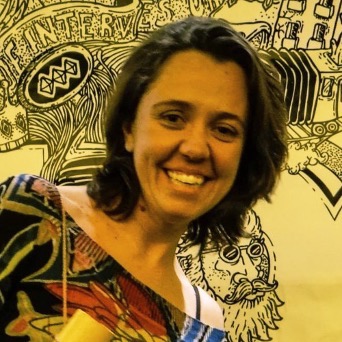
Marcia Guerra
Moderator
Executive Director
Libera Foundation, Chile
Marcia Guerra's Bio
Marcia is currently the Executive Director of Fundación Libera in Chile. Lawyer graduated in Brazil and Chile, with a Master’s degree in Sociology from UFMG/Brazil. She has practical and academic experience in the defence of human rights and the environment in the Federal Public Prosecutor’s Office and the Brazilian Courts. She has also worked assisting communities affected by large hydroelectric projects with GESTA and the Federal University of Minas Gerais.
Presentation 1 – Progress, Challenges and Weaknesses of Regulatory Frameworks on Human Rights in Due Diligence
The purpose of this presentation is to learn about the state of the art of regulatory frameworks at the international level from a critical perspective that allows us to reflect on the opportunities and gaps that exist based on existing regulations.

Adoración Guamán
Professor at the University of Labor and Social Security Law
University of Valencia, Spain
Adoración Guamán's Bio
University professor of labor and social security law at the University of Valencia. With two doctorates in Law from the University of Paris X-Nanterre and from the Universitat de València, with an extraordinary doctorate award, a master’s degree in European Union, a postgraduate degree in International Cooperation and Development and two bachelor’s degrees in Law and in Political Science and Administration.
She is currently Counselor for Labor, Social Security and Migration at the Spanish Embassy in Ecuador. Between 2020 and 2021 she was General Director of Institutional Coordination of the Second Vice-Presidency and Regional Ministry of Housing and Bioclimatic Architecture of the Generalitat Valenciana.
She is a guest lecturer in a large number of postgraduate programs in Latin America, Spain, France and Italy and has been a guest researcher at numerous prestigious Spanish and foreign universities. She coordinates the Working Group of the Latin American Council of Social Sciences called “What work for what future” and participates in various national and international research projects.
Her main line of research focuses on the feminist analysis of labor law. Another of her specific lines of study is the relationship between Due Diligence mechanisms in sustainability and their impact on labor rights and in particular on the phenomena of modern slavery and the analysis of forced labor from a gender perspective.
Her academic career includes an extensive body of work consisting of books and articles in publishers and indexed journals, the contents of which can be consulted in detail at https://webgrec.uv.es/webpages/personal/cat/I6107.html.
A good part of her publications can be found at: https://uv.academia.edu/Adoraci%C3%B3nGuam%C3%A1n
Presentation 2 – Regulatory Trends on Human Rights Due Diligence in Latin America

José Julián Tole
Director
Latin American Observatory of Human Rights and Business of the Externado University, Colombia
José Julián Tole's Bio
Director of the Latin American Observatory of Human Rights and Business at the Universidad Externado de Colombia; Ph.D. and Master’s Degree in Law and International Economic Relations from the University of Barcelona (Spain); lawyer and master’s degree in Public Law from the Universidad Externado de Colombia; with more than 15 years of experience as a teacher-researcher at this University, and as a visiting professor at European and Latin American universities, such as the National Autonomous University of Mexico, the Autonomous University of Madrid, the University of Valencia, among others. In addition, he is a member of the technical secretariat of the Human Rights Policy of the Ministry of Mines and Energy of Colombia; Member of the working group of the National Action Plan on Business and Human Rights of Colombia; member of the technical secretariat and technical advisor to the draft Law on “The responsibility of companies to respect human rights and the environment in their activities and their value chains through due diligence” of the Ombudsman’s Office of Colombia. He is the author of several books and articles specialized in human rights and business, advisor to ancestral economy projects and protection of the intangible heritage of indigenous communities (Wayuu, peoples of the Sierra Nevada, Embera Chami, etc.), international consultant for the CERALC project and international cooperation agencies, and advisor to state entities.
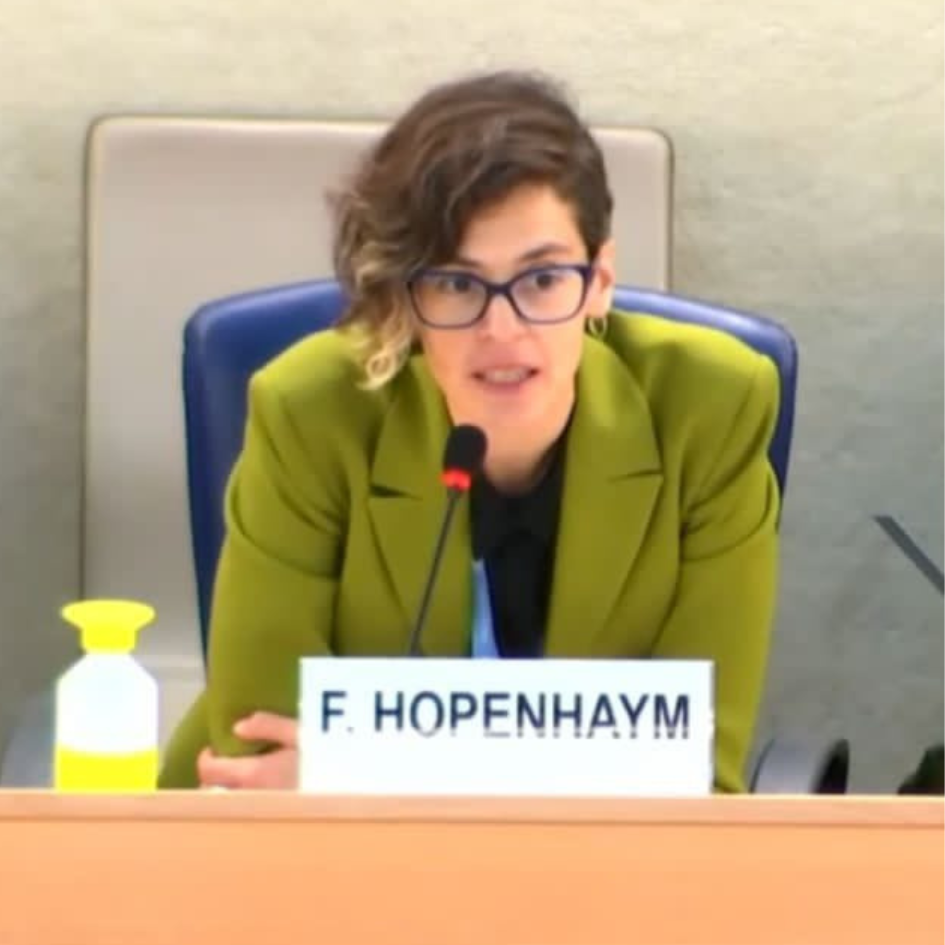
Fernanda Hopenhaym
Vice President
United Nations Working Group on Business and Human Rights
Fernanda Hopenhaym's Bio
Fernanda Hopenhaym Cabrera is a specialist in business and human rights issues. She has worked on human rights, economic justice, and gender justice issues for 25 years, focusing on corporate and financial institution accountability for the past 15 years. Since 2021, she has been an independent expert member of the UN Working Group on Business and Human Rights. In addition, she is co-executive director of the organization PODER and advisor to the organizations EarthRights International, All Out, SOMO and the foundation for the International Business and Human Rights Award.
Presentation 3. Beyond Borders, the Extraterritorial Responsibility of States in the Face of Human Rights Violations in Supply Chains.
The focus of this presentation is to contribute to the ongoing debate on the need to extend the extraterritorial obligations of States. Given the cross-border nature of forced labour and human trafficking, it is impossible to guarantee human rights and prevent corporate impunity without establishing extraterritorial responsibilities.
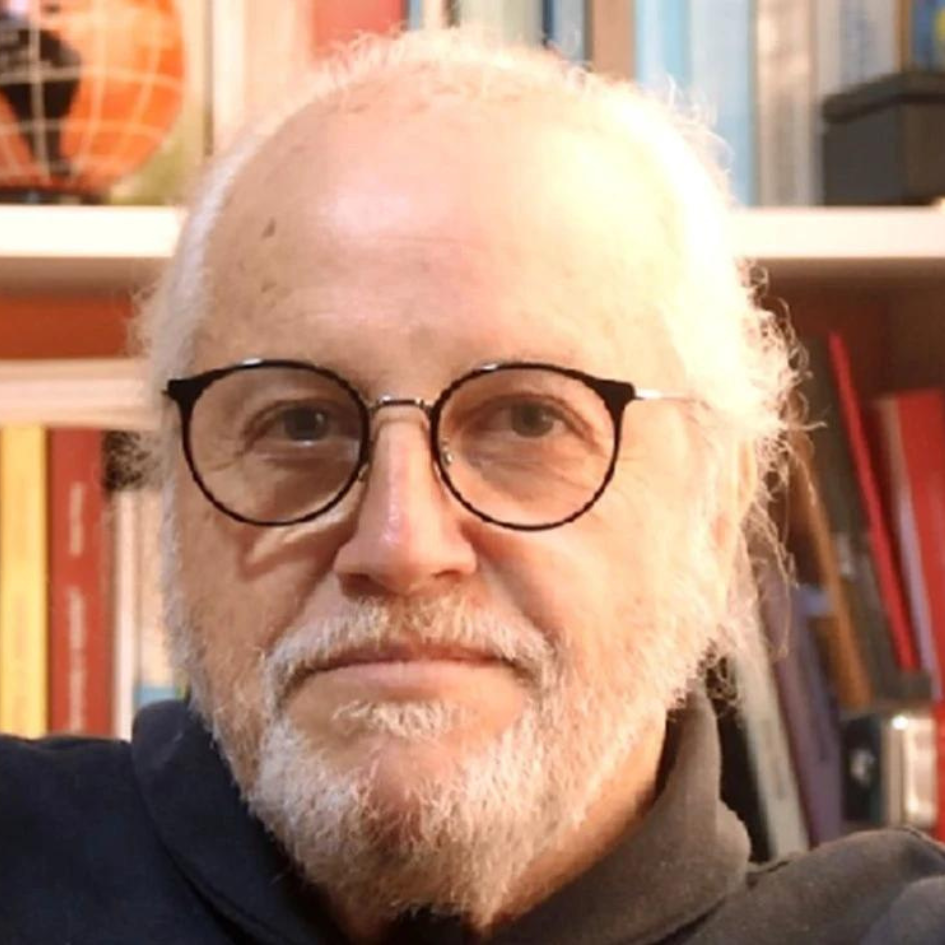
Javier Mújica
Lawyer, human rights activist
Center for Public Policy and Human Rights – Peru EQUIDAD, Peru
Javier Mújica's Bio
JAVIER MUJICA PETIT is a Peruvian lawyer with a master’s degree in human rights from the Pontificia Universidad Católica del Perú and two master’s degrees in the same subject from the University of Castilla La Mancha in Spain. He is now a member of the Center for Public Policy and Human Rights – Peru EQUIDAD, of which he has been President twice. He has led on several occasions international fact-finding missions of the International Federation for Human Rights (FIDH), which he has represented in various bodies of the Organization of American States (OAS). In recognition of his work, he was twice appointed General Coordinator of the process of formulating Peru’s first and second National Human Rights Plans.
He has acted in Peru as a member of the Advisory Council of the Office of the Comptroller General and as a senior advisor to the 4th Vice Presidency of the Congress of the Republic, being a frequent litigator in the national and inter-American human rights system. A frequent speaker, locally and internationally, at competitions, forums, and seminars on the subjects of his competence, he has also worked as a consultant, both in the parliamentary field and in that of international development cooperation agencies and the United Nations system such as the ILO, UNIFEM and UNDP.
He has published a significant number of articles, essays, and books on subjects related to Labour and Social Security law, International Human Rights Law, the rights of women, migrants, and persons with disabilities, corporate social responsibility (CSR), and the links between business and human rights.
Q&A Session
Presentation of Speakers
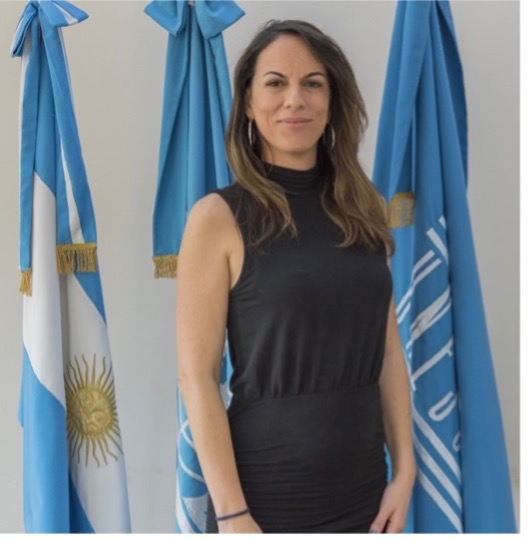
Cinthia Bellbusi
Moderator
Expert Consultant in Human Trafficking
International Centre for the Promotion of Human Rights (CIPDH-UNESCO), Argentina
Cinthia Belbussi's Bio
Cinthia Belbussi is Consultant for the International Centre for the Promotion of Human Rights CIPDH-UNESCO. Master in Gender, Society and Public Policy (FLACSO); lawyer, specialized in International Public Law (UBA). She was an international consultant for the European Union for the implementation of the Programme to Strengthen the Special Prosecutor’s Office for Human Rights in Honduras. She coordinated the Regional Programme “Initiative against Trafficking in Persons” of the NGO Global Rights with an impact in Honduras, Guatemala and Mexico. She directed the Rescue and Accompaniment Programme for Persons Victims of Human Trafficking in the province of Buenos Aires. She developed and coordinated the first state shelter for trafficked women and children (GCABA). She has been an advisor to various national and international anti-trafficking organizations.
Presentation 4. Can Due Diligence be Applied in Cases of Sexual Exploitation?
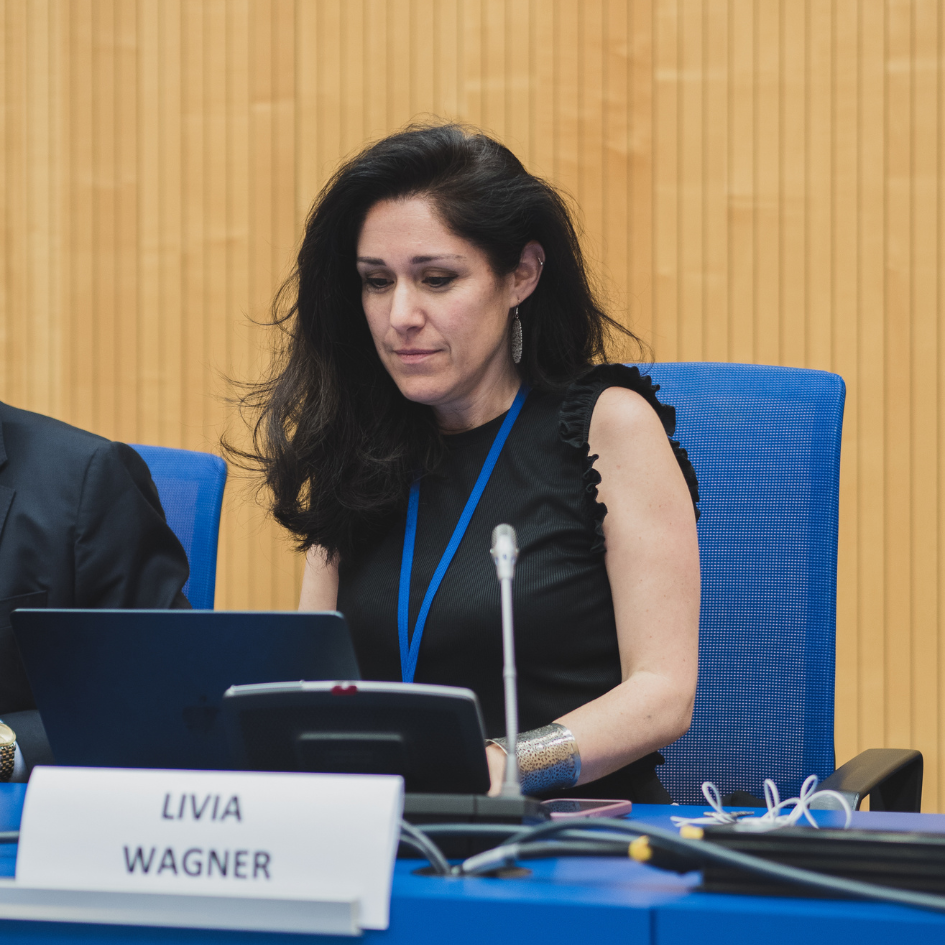
Livia Wagner
Human Trafficking Team Leader
Global Initiative Against Transnational Organized Crime (GI-TOC), Austria
Livia Wagner's Bio
Livia Wagner manages the Trafficking in Persons team and coordinates the Network of Experts and the Global Initiative Against Transnational Organized Crime.
Livia’s work primarily encompasses the issue of human trafficking for the purpose of labor and sexual exploitation, specializing in responsible supply chain management. He has thoroughly investigated natural resource trafficking, such as illegal gold mining and illegal logging, and related forms of organized crime, with a special focus on Latin America. She also coordinates the Coalition of Responsible and Ethical Business Initiative Against Trafficking (RESPECT), as well as GI-TOC’s research direction for the Anti-Trafficking Technology Initiative.
Prior to joining GI-TOC, she worked for several years as an international consultant and before that as the Private Sector Focal Point for the United Nations Global Initiative Against Trafficking in Persons (UN). GIFT) and the non-governmental organization ECPAT on trafficking in children for sexual exploitation. She also worked as a development officer for the Austrian Ministry of Foreign Affairs and the United Nations Development Programme (UNDP) on the island of Mauritius.
Presentation 5. Due Diligence for Fair and Ethical Recruitment of Migrant Workers
This presentation will present strategies and tools for companies to fulfil their responsibility to respect the human rights of migrant workers.
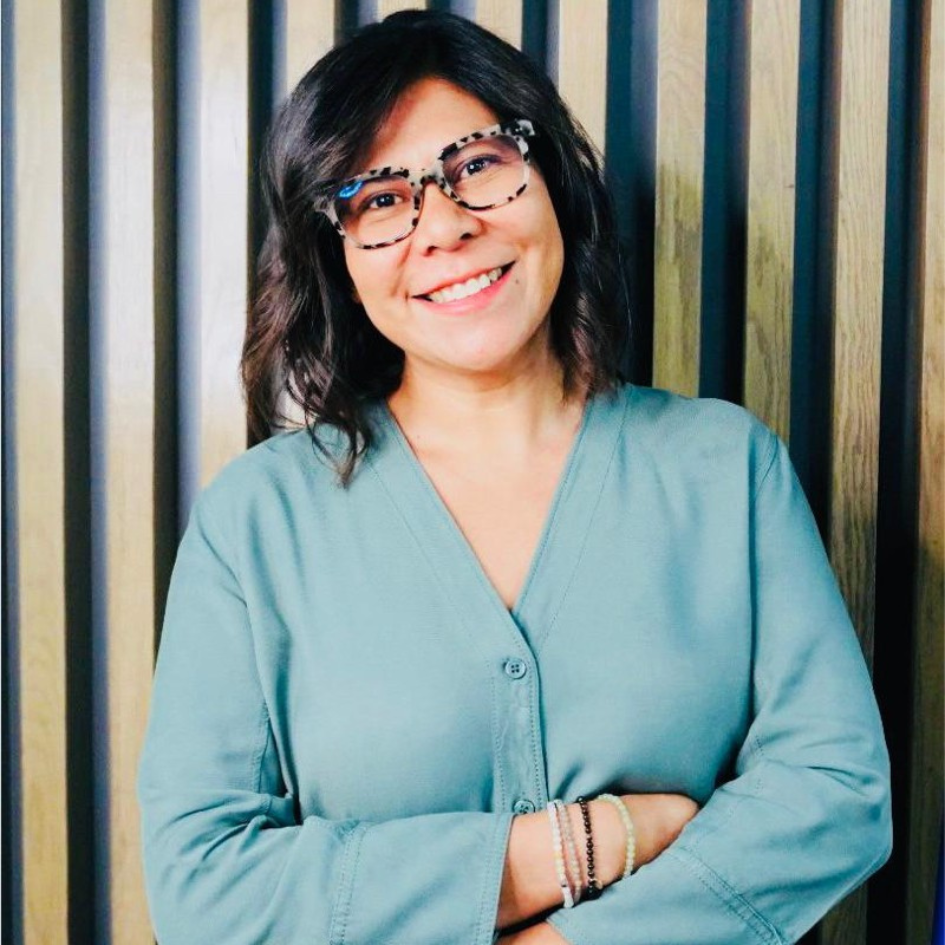
Vanessa Pocasangre
Technical Officer for Labour Migration and Human Mobility
International Labour Organization ILO, Mexico
Vanessa Pocasangre's Bio
Vanessa Pocasangre Mijango is a Salvadoran sociologist, with a master’s degree in Government and Public Management from the Pompeu Fabra University in Barcelona, and a specialization in Latin American Culture and History. His professional career is more than 18 years collaborating with International Organizations, Public Institutions and Non-Governmental Organizations in Central America, the Caribbean and the Middle East. Since 2013 she has worked with the International Labor Organization on issues related to labor migration, gender, prevention of discrimination in the world of work, youth employment, among others. Since 2020 she has been part of the ILO Office for Mexico and Cuba team as a Technical Officer on Labour Migration and Human Mobility.
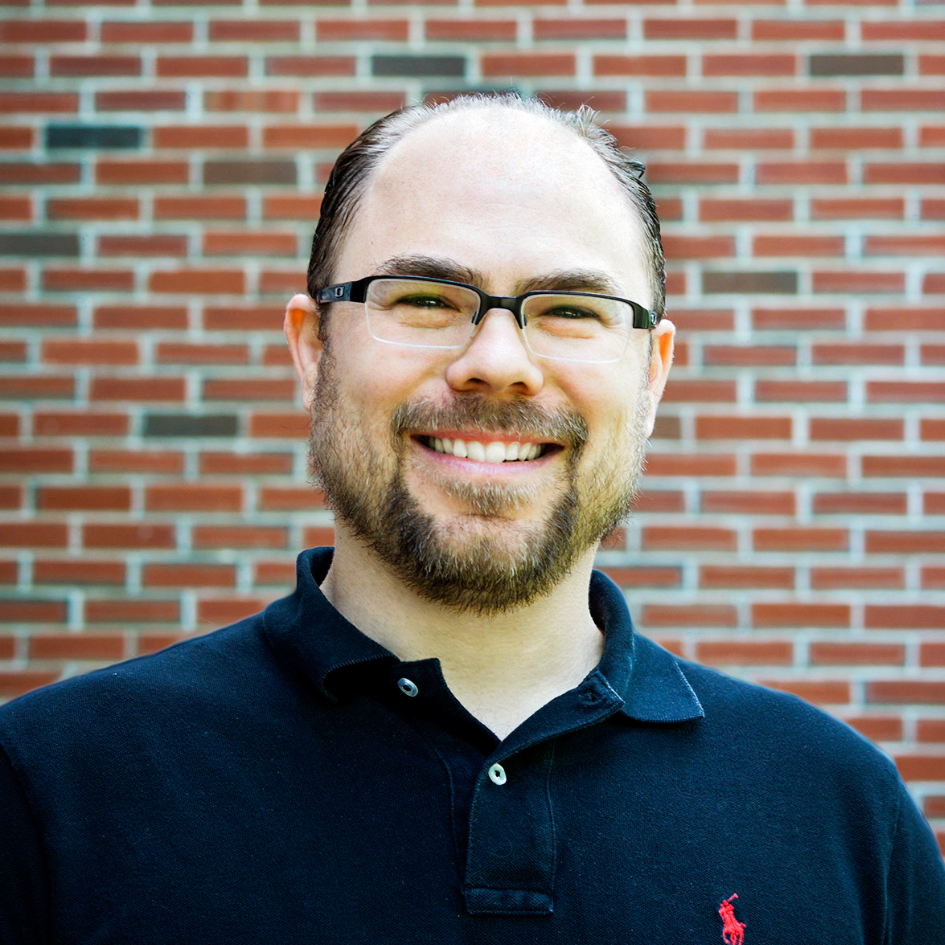
Quinn Kepes
Senior Regional Lead for the Americas
Verité, Mexico
Quinn Kepes's Bio
Quinn Kepes has worked at Verité for more than 17 years providing companies, governments, investors, intergovernmental organizations, workers, and civil society with the knowledge and tools they need to eliminate human and labor rights abuses by global supply chains. He oversees Verité’s programming and research on raw materials in the Americas. He is also the co-author of reports for the United Nations Office on Drugs and Crime, the United Nations Special Rapporteurs on Human Trafficking and Contemporary Forms of Slavery, and the Global Initiative against Transnational Organized Crime. Kepes has conducted and directed field investigations on human trafficking and other labor and human rights risks in illegal gold mining and agriculture (coffee, palm oil, sugar, livestock, corn products, peanuts, nuts). Brazil), seafood (shrimp, tuna, illegal fishing), and the clothing sector. Quinn Kepes has investigated links between organized crime and human rights abuses for Verité and other organizations.
Presentation 6. Diligence and Prior Consultation.
The focus of this dissertation will be to identify how the standards of prior consultation can inform due diligence, taking into account that transnational and national companies are the main executors of projects that affect indigenous territories and communities. For this reason, a commitment to the recognition of prior consultation is key to combating forced labour and human trafficking.
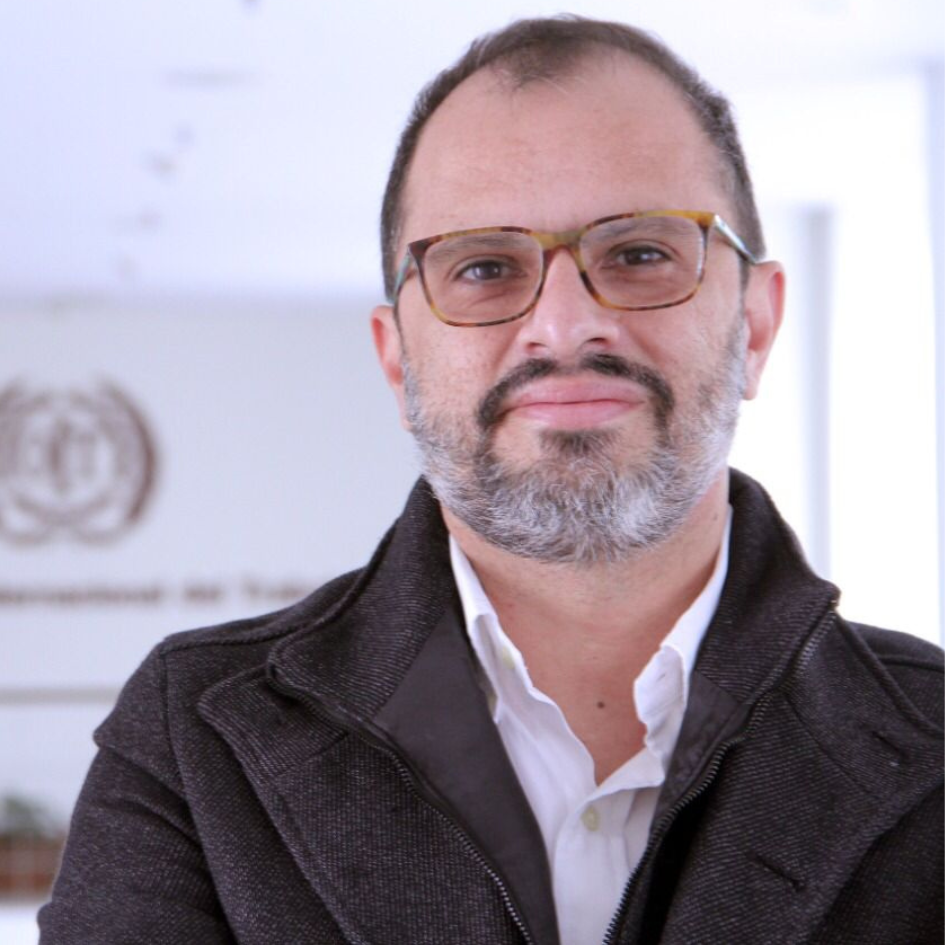
Hernán Coronado
Indigenous Peoples Specialist
International Labour Organization ILO, Bolivia
Hernán Coronado's Bio
Specialist on Indigenous Peoples (ILO) and ILO focal point for Indigenous Peoples in the Latin American region, he is currently based in Bolivia, where he coordinates the ILO Office in Bolivia, previously working at the ILO Office in Guatemala and the ILO Office in Peru. He is a lawyer by profession from the Universidad San Martin de Porres (Peru) with an International Master’s Degree in Conflicts and Development from the Universitat Jaume I, (Spain). He has more than 23 years of national and international experience in International Law and Indigenous Peoples‘ Law, held management positions in the public administration in Peru, has been a consultant to International Organizations and a visiting professor of the Legal Anthropology Program at the Faculty of Law of the University of Chile. He has also been a professor of indigenous peoples‘ law courses at universities in Peru.
Q&A Session
Practical Case 1: Eliminating Slave Labor in Supply Chains
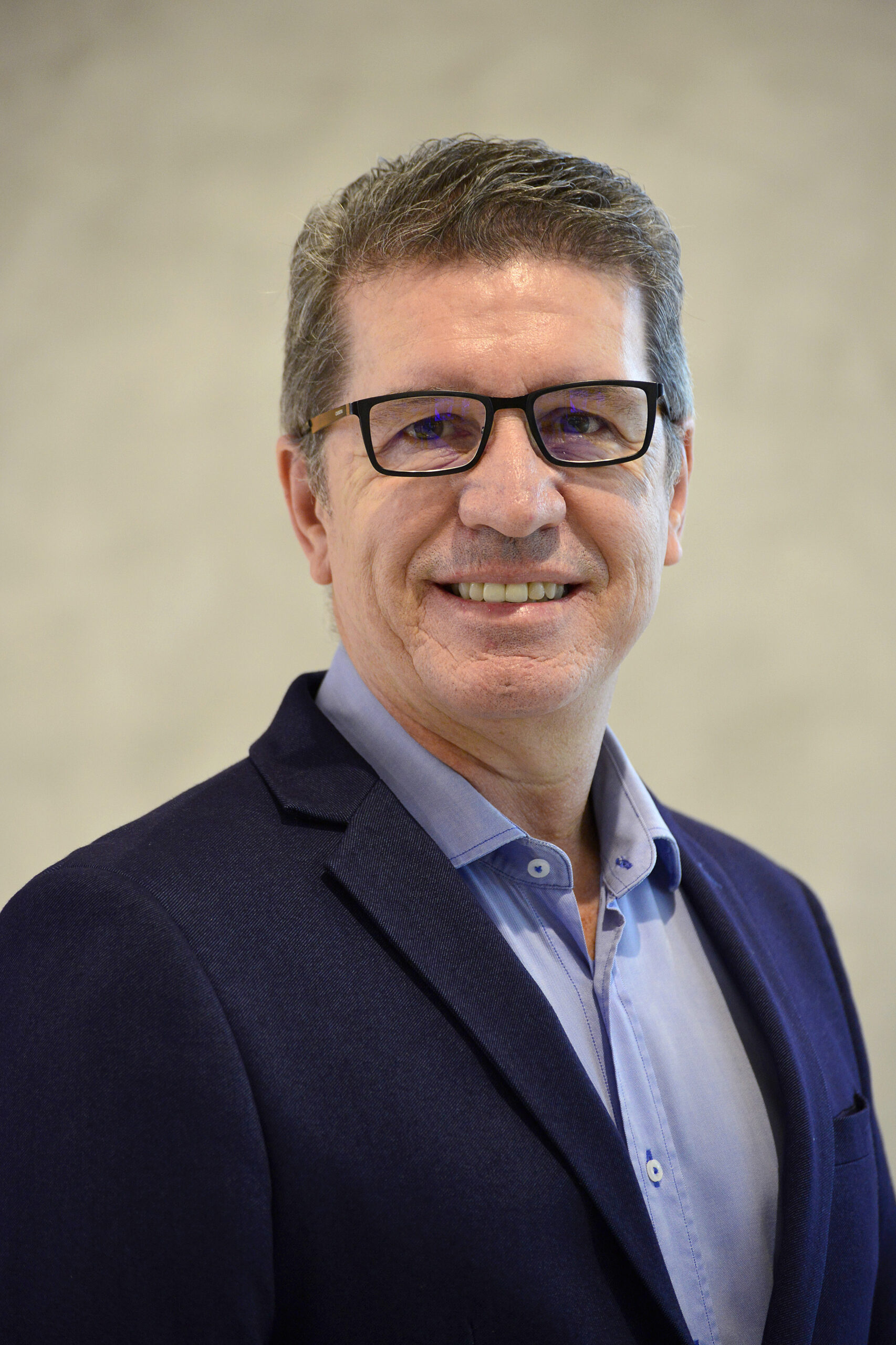
Edmundo Lima
Executive Director
ABVTEX – Brazilian Textile Retail Association
Building a Movement Narrative
The 2024 – 2025 Freedom from Slavery Forum Series is an opportunity for regional and global stakeholders in the anti-modern slavery movement to co-construct a narrative that galvanizes the world to end modern slavery. We want this narrative to be one that a majority of the stakeholders and anti-modern slavery colleagues can support. One that is broad enough to enable regionally specific sub-narratives but that captures the essence of the issue we are trying to address. Participants of each Regional Forum will have the opportunity to review the proposed narrative and provide feedback based on their experiences and regional and local priorities. The narrative session at the 2024 Latin America Forum will introduce the narrative, its purpose, and key questions where feedback from stakeholders is needed to improve and refine the narrative. Following this Forum online consultations will be organized for forum participants to provide specific feedback and hear perspectives from other stakeholders in the region.
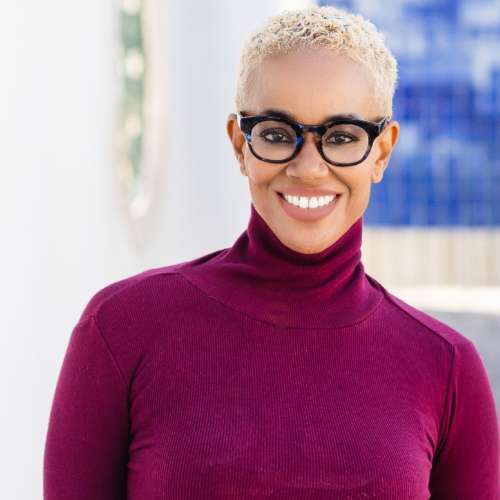
Brook Bello
Founder
MoreTooLife, USA
Brook Bello's Bio
Brook’s impact extends to digital education platforms addressing sexual exploitation. She launched Eval, a mental healthcare tech, chosen by Techstars Founders Catalyst. A Master’s Series alumnus, she holds a US Patent, creating innovative software in mental healthcare, AI, and machine learning.
An accomplished author, Brook’s works include “Living Inside The Rainbow” and “S+CxM=O.” Recent releases, “Shame Undone” and “Fine Heart Table Book,” showcased at special events in Monaco, reflect her commitment.
With a Ph.D. in Pastoral Clinical Counseling, Brook is a global speaker recognized by the United Nations and Google Next-Gen Fellow. Advocate of the Year in Florida, she collaborates with entities like the FBI, DOJ, and Harvard. An inspiration to all genders, Brook, with her unwavering stance, resides in South Florida, amplifying voices for a better world.
Closing Remarks Day 1.
Wednesday April, 17
Effective Victim Reparation and Inclusive Due Diligence Strategies for the Prevention of Forced Labor and Human Trafficking.
Recent studies show that initiatives involving workers participation do not achieve significant change on the ground. Rather, studies and some experiences show that involving trade unions and workers promotes a balance of power and better results in practice. In this session, we invite you to learn about some specific cases.
Welcome and Opening Remarks.

Davina Durgana
Master of Ceremony
International human rights statistician
Minderoo Foundation, USA
Davina Durgana's Bio
Davina P. Durgana, PhD is an award-winning international human rights statistician and professor with almost 15 years of experience developing leading global models to assess risk to modern slavery. Dr. Durgana is Senior Multilateral Engagement Advisor of the Minderoo Foundation and leads Americas Policy and Quantitative Research as a Report Co-Author of the Global Slavery Index of Walk Free. Minderoo Foundation is one of the largest philanthropies in Asia-Pacific with over $2 billion AUD in funding across an array of issues from eliminating plastic waste in the oceans to ending modern slavery. She is fluent in French, Spanish, and English.
Dr. Durgana is an AAAS Ambassador, Forbes Under 30 Alumni board member, and serves on the Board of Directors of Free the Slaves. She is an American Statistical Association Statistical Advocate of the Year, and Chair of Statistics without Borders, and she has been widely recognised for her work on statistical modeling, human security theory, and human trafficking. Dr. Durgana collaborated on two episodes of Emmy-nominated series Mission Unstoppable and will be featured in upcoming book “Wonder Women of Science: Twelve Geniuses Who Are Currently Rocking Science, Technology, and the World” by Candlewick Publishers to help encourage women and girls to see the ways STEM can be used in everyday life and exciting fields.
Dr. Durgana has over 28 publications and she is a prolific and effective public speaker. She has given over 100 invited talks, including over 30 keynote addresses. Dr. Durgana is a Royal Chartered and Professionally Accredited Statistician. Since 2013, she has also served as a Professor of Research Methods, Irregular Warfare, International Development, Global Public Health, and Inclusive and Human Security at leading universities.
Presentation of Speakers

Laura Lanza
Moderator
Advisor in the area of Studies and Research.Projects for LATAM, Caribbean and Africa
International Centre for the Promotion of Human Rights (CIPDH-UNESCO), Argentina
Laura Lanza's Bio
Laura is an advisor in the area of “Studies and Research” at the International Centre for the Promotion of Human Rights (CIPDH-UNESCO). She was a consultant in legal and legislative matters to Deputy Gustavo Vera in the Legislature of the Government of the City of Buenos Aires, who later assumed the position of Director of the “Executive Committee against Trafficking and Exploitation of Persons and for the Protection and Assistance to Victims” under the Executive Branch of the Argentine Republic. She was an advisor to the Constitutional Law and Labor Law Commissions of the above-mentioned Deputy . She provided legal advice and accompanied in the judicial processes of victims rescued from the crime of Sex Trafficking and Forced Labor. She provided legal assistance to people who denounced the crime of Trafficking in Persons as well as to victims of it, at the “Fundación Alameda”, an international non-governmental organization based in Buenos Aires, Argentina, dedicated to the fight and eradication of Trafficking in Persons. It trained employees of the “United Union of Technical Educators of the Argentine Republic” (SUETRA) on Labor Trafficking. She shared a panel of knowledge and experiences with Evelina Cabrera, Goodwill Ambassador for “Gender Equity” of the Organization of American States (OAS), within the framework of the III World Forum on Human Rights that took place in Buenos Aires in March 2023.
Presentation 1 – Grievance and Reparation Mechanisms.
This presentation will identify and learn about existing complaint mechanisms to access effective reparation for victims, analyze the obstacles they present, as well as the relevant advances in this regard.
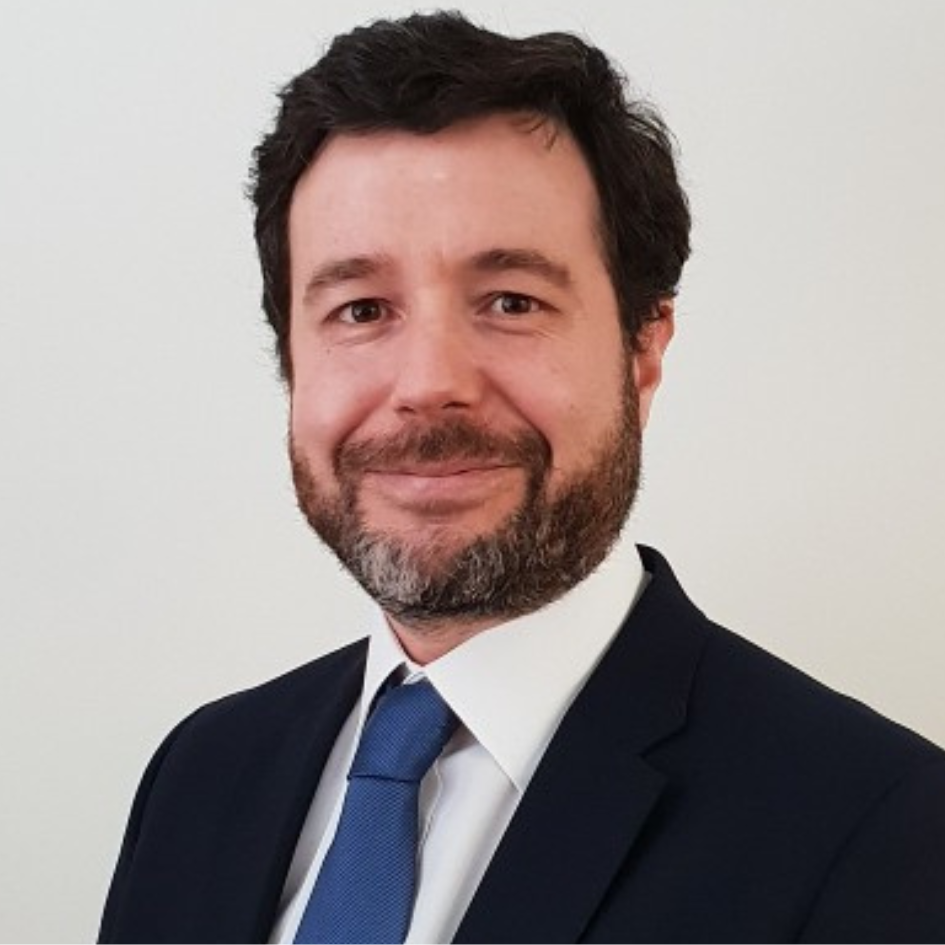
Felipe Henríquez
Chief, Responsible Business Conduct Division Undersecretariat for International Economic Affairs.
Chile’s National Contact Point for the OECD Guidelines, Chile
Felipe Henríquez's Bio
Felipe Henríquez has been an official of the Undersecretariat of International Economic Relations (SUBREI) since 2011. He currently serves as Chile’s National Contact Point (NCP) for the OECD Guidelines on Multinational Enterprises and head of the Responsible Business Conduct (CER) Division. In addition, he has extensive experience as a trade diplomat. Between 2016 and 2021, he was Counsellor at the Permanent Mission of Chile to the World Trade Organization (WTO). He holds an Executive Master’s Degree in Environmental Governance and Policy Development from the Graduate Institute of International Studies (Geneva, Switzerland) and is a lawyer from the University of Concepción (Chile).
Presentation 2. Worker-Centred Human Rights Due Diligence.
The focus of this presentation is to propose that the due diligence approach can be better achieved if it is developed with the participation of trade unions and workers.
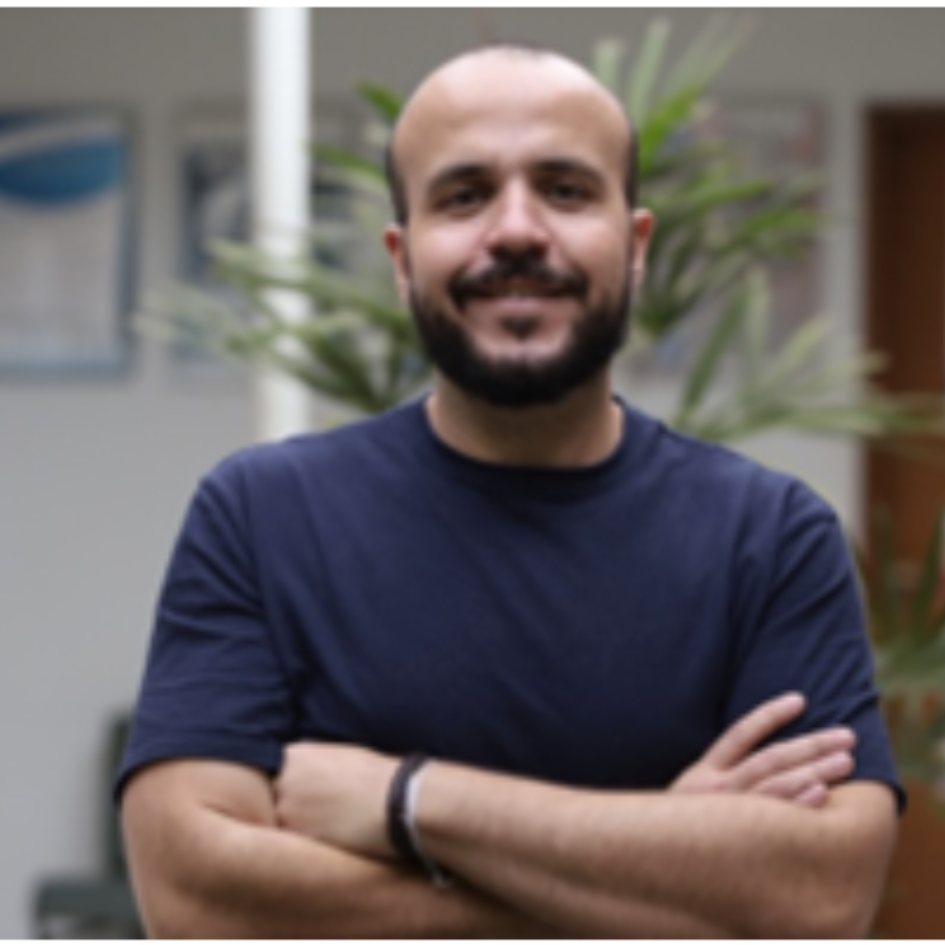
Carlos Eduardo Silva
Labor lawyer. Brazil.
Carlos Eduardo Silva's Bio
Carlos Eduardo Silva was an advisor to the Federation of Agricultural Workers in the State of Bahia (FETAG-BA), the National Confederation of Agricultural Workers (CONTAG) and the National Confederation of Rural Salaried Workers representing workers in the National Commission for the Eradication of Slave Labor – CONATRAE between 2011 and 2024. Participated in the construction of the National Policy for Rural Workers Employed by the Brazilian Government. He was a project analyst at Reporter Brasil between 2020 and 2023, working on a project to promote human rights in production chains. For 19 years he has been providing assistance to NGOs and trade unions in the construction of collective employment contracts, especially in the export chains of agricultural and livestock products.
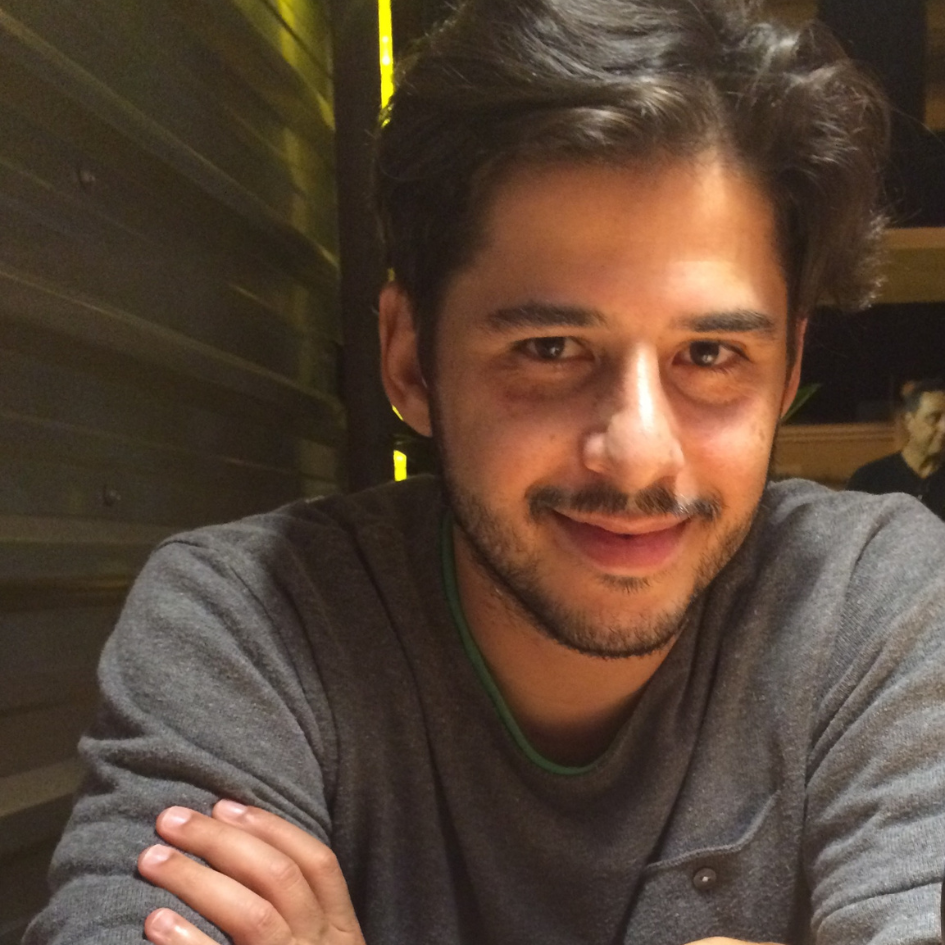
Marcel Gomes
Executive Secretary
Reporter Brazil, Brazil
Marcel Gomes's Bio
Marcel Gomes is a journalist, he obtained a master’s degree in political science from the University of São Paulo (USP) and a doctorate in Energy Systems Planning from the Faculty of Mechanical Engineering of the State University of Campinas (Unicamp).
Presentation 3. What Should Be the Role of Survivors?
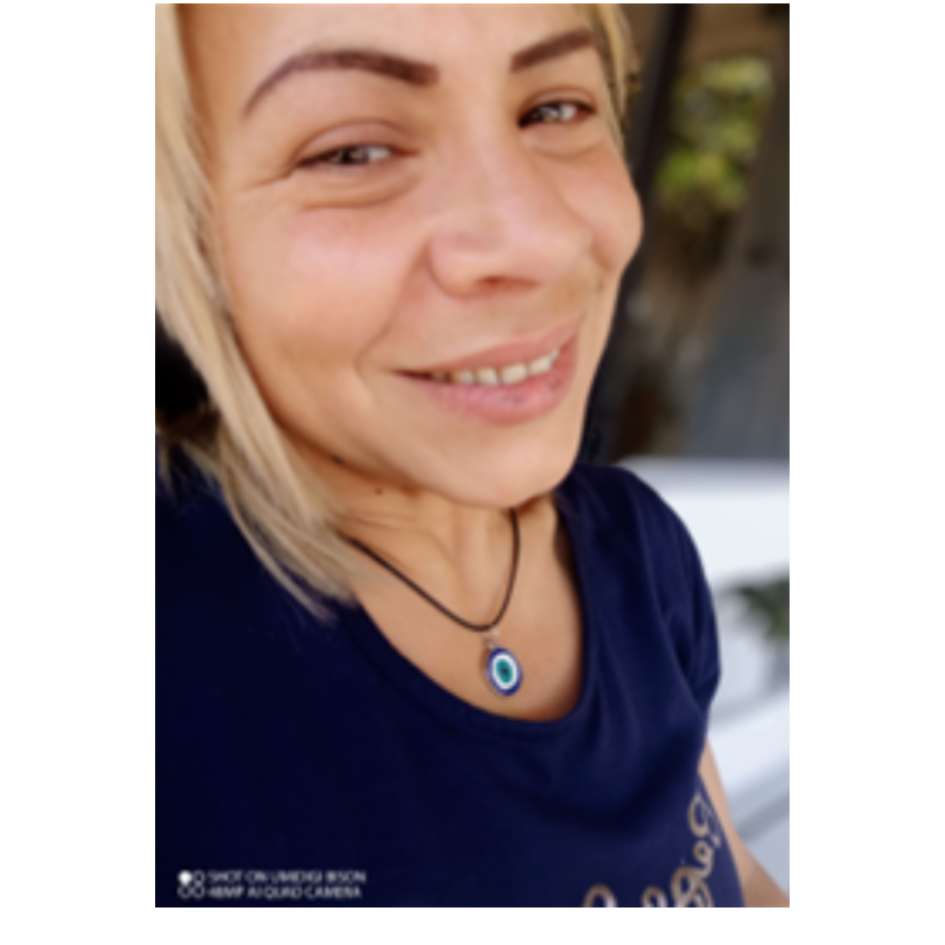
Yesenia Díaz
Survivor Leader
Survivor Alliance, Chile/Venezuela
Yesenia Díaz's Bio
Yesenia is a Human Rights Activist, she collaborates with Survivor Alliance and the NGO Fundación Libera. She is a Venezuelan resident in Chile since 2018 where she was a victim of forced labor in the agricultural sector. She is a cook, pastry chef, ceramic forger and seasonal farmer. She is also a mother of two children.
Q&A Session.
Presentation of Speakers
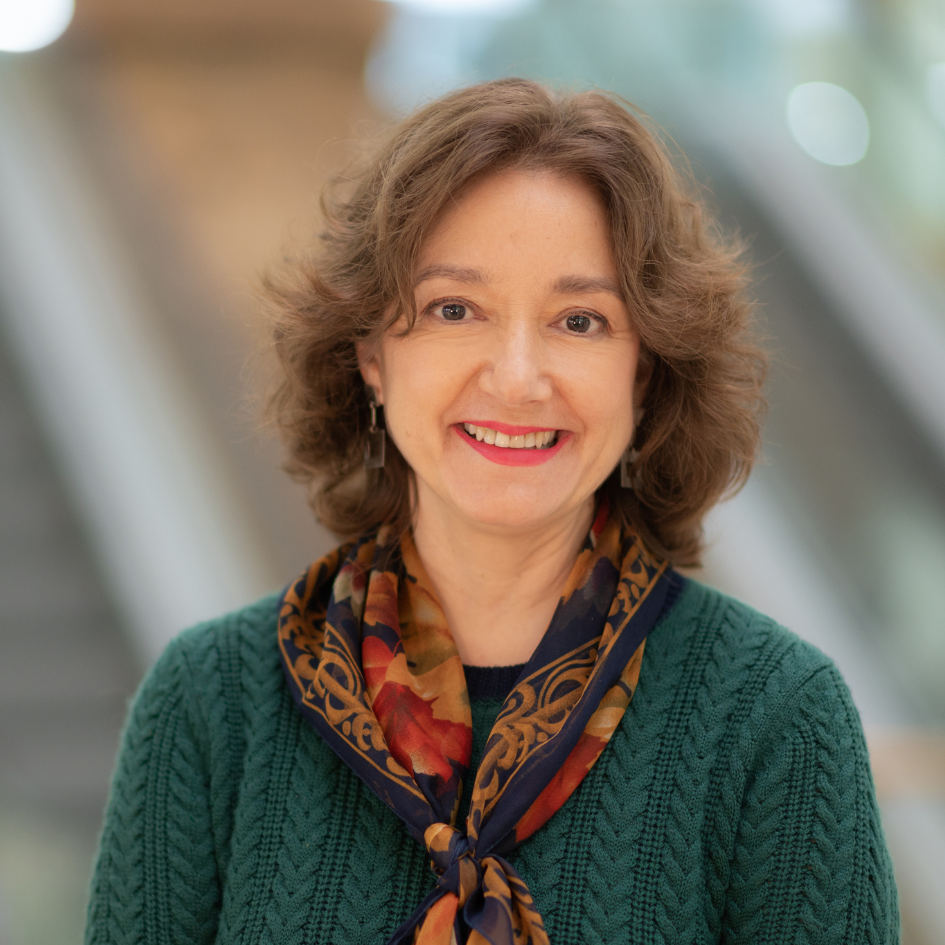
Tamara Agnic Martínez
Moderator
President
ETICOLABORA, Chile
Tamara Agnic Martínez's Bio
Expert in corporate governance, compliance and integrity and anti-corruption systems, as well as ESG factors. She has solid knowledge and management of international and local standards on prevention and combating money laundering and terrorist financing. Consultant specialized in corporate governance, ethics and integrity, compliance, and collaborative solutions for sustainable economic development. Executive Director of the Promote Women Chile Program whose purpose is to increase the presence of women in the management positions of companies, thus promoting shared and integrative leadership (Public-private project of the CPC, Icare and the Ministries of Women and Economy). She is a partner at KPMG Chile where she led the Forensic and Sustainability Services areas, covering cross-cutting issues of Corporate Governance, Integrity and Ethics, free competition, reputational risks, among others. She directed the Financial Analysis Unit (UAF), a decentralized public institution, responsible for preventing and impeding the use of the financial and non-financial system in Chile to launder money and/or finance terrorism. She advised the Ministry of Finance between 2004 and 2009, where she led important negotiations with different unions and social and business organizations.
Presentation 4. Due Diligence in the Prevention of Money Laundering.

Carolina Rudnick
President
Libera Foundation, Argentina
Carolina Rudnick's Bio
Carolina Rudnick is a lawyer from Universidad de Concepción, and a Master in Criminal Policy from the London School of Economics and Political Science. She is a Fulbright Hubert H. Humphrey Fellow from the American University, specializing in human trafficking, corruption and international human rights law. Carolina is a member of the Capra Course Network, she has taken postgraduate courses in constitutional law and fundamental rights at the Universidad Carlos III de Madrid, studies in moral philosophy at the Universidad de Concepción and studies in philosophy of science at the IFICC. She served as a lawyer in the Department of Organized Crime of the Ministry of Interior and Public Security of Chile, from where she coordinated the Intersectoral Roundtable on Trafficking in Persons and its national action plan 2013-2014. During 2016-2018 she was in charge of International Affairs of the Financial Analysis Unit (UAF), from where she led the construction of the Second National Strategy against money laundering and terrorist financing 2018-2020. She served as head of international relations of the Ministry of Women and Gender Equity of Chile 2022.She co-founded and chaired Fundación Libera, a non-profit organization against human trafficking and contemporary forms of slavery. She has been a lecturer at several Chilean universities, a consultant for the Inter-American Commission of Women and Eurosocial+, and a researcher at the British Institute of International and Comparative Law.
Translated with DeepL.com (free version)
Presentation 5. Public-Private Partnership Against Modern Slavery.
The presentation will address the role of the financial sector in the fight against modern slavery, as it is strongly intertwined with the global economy.
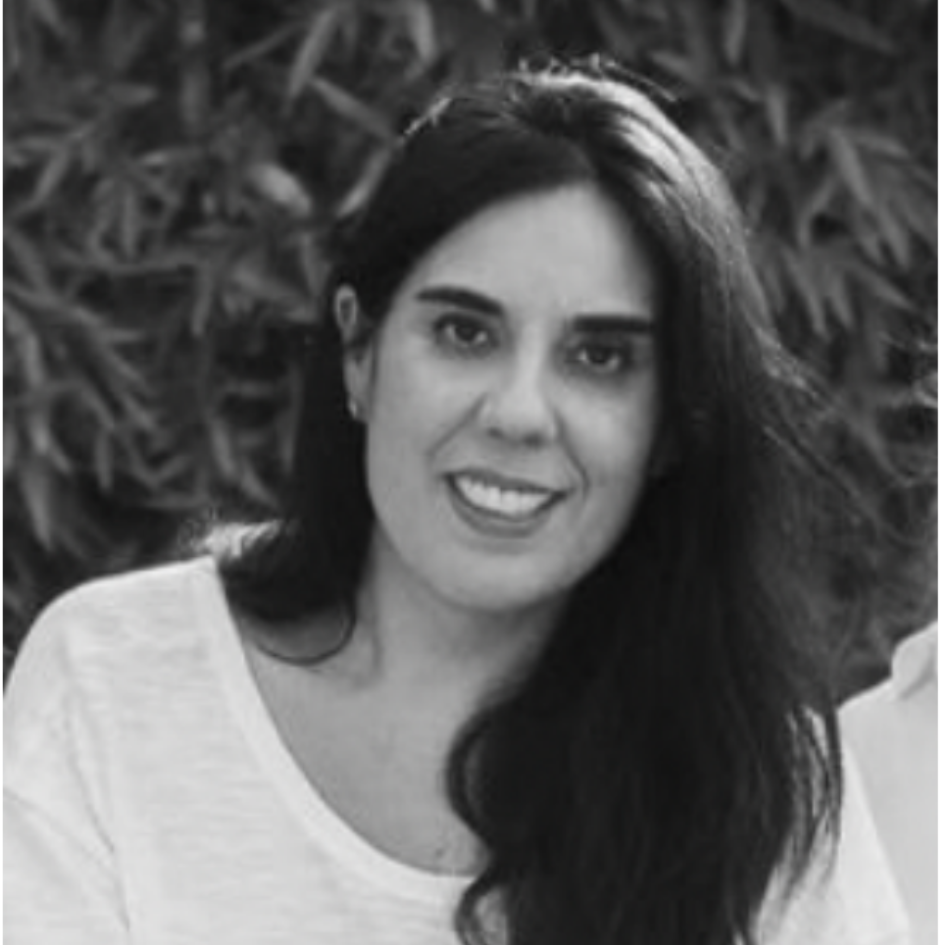
Jimena Sánchez
Amfori representative for Latin America
amfori, Argentina
Jimena Sánchez's Bio
Jimena Sánchez has held the position of AMFORI Network Representative for Latin America since June 2018. Prior to joining AMFORI, she held the role of Sustainability and Quality Leader in the Ambiente non-alcoholic beverage sector for Argentina and Uruguay. Her experience includes an outstanding performance in the field of audits and training at SGS Argentina. Initially, Jimena forged her professional foundations in the petroleum sector and the chemical industry.
Currently, at AMFORI, Jimena deploys her expertise providing support to members and producers to address the ESG aspects of Supply Chains through the Due Diligence approach in Human Rights and the Environment. She has a solid initial training in Environmental Management, complemented by specializations in Environmental Law from the University of Buenos Aires and Integral Quality Management at ITBA, among other complementary studies. Their commitment and knowledge support sustainable development in the business environment and the promotion of responsible practices in the supply chain.
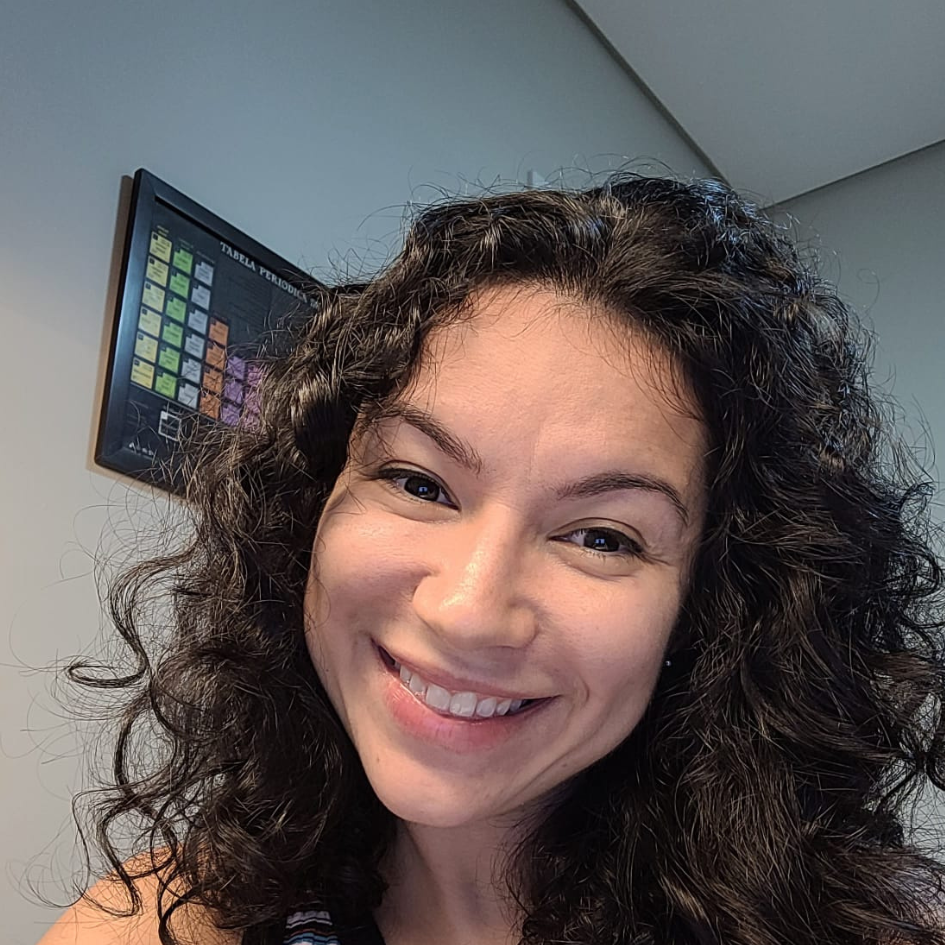
Jamile Freitas Virginio
Tax Auditor
Secretariat of the Labor Inspection, Ministry of Labor and Employment, Brazil
Jamile Freitas' Bio
Labor Inspector since 2010, she acts in the General Coordination of the Fight against Slavery-Analogous Work and Human Trafficking of the Brazilian Ministry of Labor. Graduated in Law, she is also a specialist in Law and Labor Process.
Q&A Session.
Practical Case 1: Technological Innovation for Inclusive Complaint Mechanisms in the Protection of Labor Rights in Latin America

Vera Belazelkoska
Managing Director
Ulula
Practical Case 2: Public Policies for Labor Reintegration for Victims of Trafficking and Slave Labor. Cooperative Textile Pole

Nestor Escudero
Member of the Alameda Foundation.
CDI Coordinator Barracas, Argentina
Closing Remarks.
2024 Latin America Regional Forum Planning Committee

Daniela Zambrano
Lawyer
Caribe Arirmativo
Daniela Zambrano's Bio
Daniela is a Lawyer at Corporation Caribe Afirmativo, a specialist in human rights with a master’s degree in critical studies of contemporary migration. At Caribe Afirmativo she accompanies and represents LGBTIQ+ victims of gender-based violence and violence based on prejudice, including victims of human trafficking. She coordinates activities aimed at documenting and evidencing scenarios of trafficking and exploitation of LGBTIQ+ people, as well as human rights violations

Gemma Bardaji Blasco
Europe and Latin America Manager
Free the Slaves
Gemma Bardaji Blasco's Bio
Gemma Bardají Blasco is the FTS Europe and Latin America manager. She has degrees in social and cultural anthropology and postgraduate degrees in culture of peace and gender in development. Gemma has 25 years of international experience, touting expertise in women’s rights; mainstreaming the gender perspective; political participation of women; and, electoral system designs. She managed the Free the Slaves project with the International Association of Women Judges and MUDHA, funded by the U.S. State Department, working to ensure prevention of trafficking in persons, and protection of survivors in majority Haitian descendant-populated batey communities in the Dominican Republic.
Prior to working with Free the Slaves, she worked at the National Migration Institute in the Dominican Republic, where she was responsible for projects pertaining to gender and human trafficking issues. Specifically, she contributed to the development of the National Plan to Combat Human Trafficking and the Illicit Tracking of Migrants with the government of the Dominican Republic. Ms. Bardají also previously worked for more than seven years as an independent consultant within the United Nations system, working both at regional and international levels. She served as a contributor to the Network for Experts on Gender for the United Nations Development Program in Latin America for four years.
Her work has largely focused on social research, methodological design, and planning. In addition to her work in the Dominican Republic, Gemma has also worked in other countries throughout Latin America, including in Bolivia and Guatemala.

JAIME MORO SAAVEDRA
Intern
Free the Slaves
JAIME MORO SAAVEDRA Bio
Journalist graduated from the University of Valladolid, specializing in International Humanitarian Action and migration studies after completing the Erasmus program + NOHA Master. He has worked on the ground in Palestine, Jordan, Serbia, Greece, Malta, and Spain, participating in humanitarian and development cooperation projects with affected communities and displaced people. His commitment to human rights leads him to dedicate his career to improving the conditions of those who go through adverse circumstances.
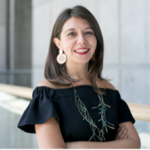
Carolina Rudnick
President
Fundación Libera
Carolina Rudnick's Bio
Carolina is a Lawyer from the Universidad de Concepción, with a Master’s in Criminal Policy from the London School of Economics and Political Science. She is a Fulbright Hubert H. Humphrey Fellow from the American University, specializing in human trafficking, corruption, and international human rights law. Carolina us a member of the Capra Course Network, she has taken postgraduate courses in constitutional law and fundamental rights at the Universidad Carlos III de Madrid, studies in moral philosophy at the Universidad de Concepción and studies in philosophy of science at the IFICC. She worked as a lawyer in the Organised Crime Department of the Ministry of Interior and Public Security of Chile, where she coordinated the Intersectoral Roundtable on Human Trafficking and its national action plan 2013-2014. During 2016-2018 she was in charge of International Affairs at the Financial Analysis Unit (UAF), from where she led the construction of the Second National Strategy against money laundering and terrorist financing 2018-2020. She served as head of international relations at the Chilean Ministry of Women and Gender Equality in 2022, co-founded and chaired Fundación Libera, a non-profit organisation against human trafficking and contemporary forms of slavery. She has been a lecturer at several Chilean universities, a consultant for the Inter-American Commission of Women and Eurosocial+, and a researcher at the British Institute of International and Comparative Law.

Marcia Guerra
Executive Director
Fundacion Libera
Marcia Guerra's Bio
Marcia is currently the Executive Director of Fundación Libera in Chile. Lawyer graduated in Brazil and Chile, with a Master’s degree in Sociology from UFMG/Brazil. She has practical and academic experience in the defence of human rights and the environment in the Federal Public Prosecutor’s Office and the Brazilian Courts. She has also worked assisting communities affected by large hydroelectric projects with GESTA and the Federal University of Minas Gerais.

Joel Huamán Balbuena
Program Coordinator
ONOTZI
Joel Huaman Balbuena's Bio
A sociologist by profession, with a Master’s degree in business administration and public management, he is currently the director of projects, programmes and activities of the NGO Onampitsite Noshaninkaye Tzinani, which has been working for more than 15 years for the vindication of the rights and development of the population of indigenous communities in Peru.
Joel Huaman Balbuena has also been working with men to prevent gender-based violence in the National Programme for the Prevention and Eradication of Violence against Women and Family Members (Programa Nacional para la Prevención y Erradicación de la Violencia contra las Mujeres e Integrantes del Grupo Familiar)

Nancy Cinthya Gozales Pérez
General Coordinator
ONOTZI
Nancy's Bio
Daniela is a Lawyer at Corporation Caribe Afirmativo, a specialist in human rights with a master’s degree in critical studies of contemporary migration. At Caribe Afirmativo she accompanies and represents LGBTIQ+ victims of gender-based violence and violence based on prejudice, including victims of human trafficking. She coordinates activities aimed at documenting and evidencing scenarios of trafficking and exploitation of LGBTIQ+ people, as well as human rights violations

Cinthia Belbussi
Expert consultant on Human Trafficking
International Centre for the Promotion of Human Rights CIPDH-UNESCO
Cinthia Belbussi's Bio
Cinthia Belbussi is Consultant for the International Centre for the Promotion of Human Rights CIPDH-UNESCO. Master in Gender, Society and Public Policy (FLACSO); lawyer, specialized in International Public Law (UBA). She was an international consultant for the European Union for the implementation of the Programme to Strengthen the Special Prosecutor’s Office for Human Rights in Honduras. She coordinated the Regional Programme “Initiative against Trafficking in Persons” of the NGO Global Rights with an impact in Honduras, Guatemala and Mexico. She directed the Rescue and Accompaniment Programme for Persons Victims of Human Trafficking in the province of Buenos Aires. She developed and coordinated the first state shelter for trafficked women and children (GCABA). She has been an advisor to various national and international anti-trafficking organizations
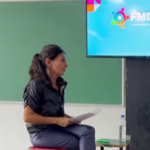
Laura Lanza
Advisor
LATAM, Caribbean and Africa of the International Centre for the Promotion of Human Rights CIPDH-UNESCO
Laura Lanza's Bio
Laura is the advisor in the area of “Studies and Research” of the International Centre for the Promotion of Human Rights (ICPDH-UNESCO). She was a consultant in legal and legislative matters to Deputy Gustavo Vera, currently Director of the “Executive Committee against Trafficking and Exploitation of Persons and for the Protection and Assistance to Victims” under the Executive Power of the Argentine Republic.
She provided legal advice and accompanied victims rescued from the crime of sexual trafficking and forced labor in legal proceedings. She provided legal assistance to people denouncing the crime of human trafficking as well as to victims of the same, in the “Alameda Foundation”, a non-governmental organization dedicated to the fight and eradication of human trafficking. She trained employees of the “Sindicato Unido de Educadores Técnicos de la República Argentina” (SUETRA) on labour trafficking.

Christina Rangel
Founder & Director
United Justice
Christina Rangel's Bio
Christina is the founder and executive director of United Justice, a non-profit organization fighting sex trafficking in Latin America. United Justice focuses on creating effective resources for victims of sex trafficking, as well as supporting families in Mexico that are searching for their forcibly disappeared children who are victims of human trafficking. With over five years of experience as an advocate for victims of trafficking with the FBI and over twelve years of experience combating sexual exploitation in nine countries, Christina brings her knowledge and personal experience to the fight against sexual exploitation. Through partnerships with the US Department of Justice, the FBI and other local non-profit organisations, Christina has trained over 3,000 law enforcement and first responders in the United States and Mexico. Her direct work with victims in Cambodia, Vietnam, Mexico, Colombia, Ecuador and the United States gives her unique access to effectively combat sex trafficking from a human rights perspective. She resides in the San Francisco Bay Area, California.

Quinn Sandor Kepes
Senior Director
Verité
Quinn Sandor Kepes's Bio
Quinn Sandor Kepes is the Senior Program Director in the Raw Materials Programs Department at Verité, where he has worked for over 14 years providing companies, governments, investors, intergovernmental organizations, workers and civil society with the knowledge and tools they need to eliminate human and labour rights abuses from global supply chains. He oversees Verité’s programming and research on commodities in the Americas. He has also co-authored reports for the United Nations Office on Drugs and Crime, the UN Special Rapporteurs on Trafficking in Persons and Contemporary Forms of Slavery, and the Global Initiative against Transnational Organised Crime. Kepes has conducted and led field research on human trafficking and other labour and human rights risks in the illegal gold mining and agriculture (coffee, palm oil, sugar, cattle, corn products, peanuts, Brazil nuts), seafood (shrimp, tuna, illegal fishing) and garment sector. Quinn Kepes has researched the links between organised crime and human rights abuses for Verité and other organisations
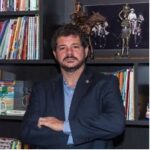
Antonio Rosa
Director de Programas
Verité
Antonio Rosa's Bio
Since August 2022 Antonio has been the Project Director of COFFEE for Verité. From January 2019 to August 2022, he was the Director of a non-profit organization that aims to defend human rights in the workplace called “Decent Work Institute” Antonio has extensive experience in the United Nations System.
2024 Latin America Regional Freedom from Slavery Forum Planning Committee






Organized by:

2024 Forum Sponsors


